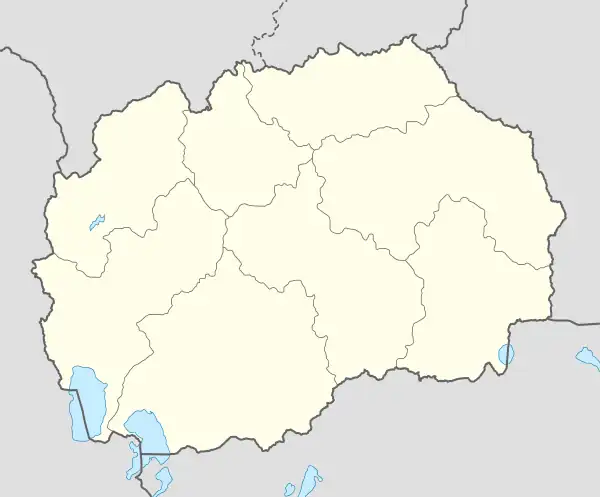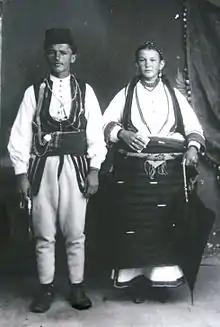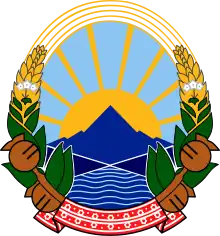Demir Hisar
| |
|---|---|
Town | |
.jpg.webp) | |
 Flag  Coat of arms | |
 Demir Hisar Location within North Macedonia | |
| Coordinates: 41°13′15″N 21°12′11″E / 41.22083°N 21.20306°E | |
| Country | |
| Region | |
| Municipality | |
| Government | |
| • Mayor | Nikola Najdovski (VMRO-DPMNE)[1] |
| Population (2021) | |
| • Total | 2,431 |
| Time zone | UTC+1 (CET) |
| • Summer (DST) | UTC+2 (CEST) |
| Area code | (+389) 047 |
| Car plates | DH |
| Climate | Cfb |
Demir Hisar (Macedonian: Демир Хисар [dɛˈmir‿xisar] ⓘ) (formerly Murgaševo until 1946) is a small town in North Macedonia. It is the seat of Demir Hisar Municipality.
Etymology
The name of the town comes from Ottoman Turkish Demir Hisar (Iron Fortress) when the settlement was part of the Ottoman Empire.
Demographics
The Yugoslav census of 1953 recorded 902 people in Demir Hisar of whom 449 were Macedonians, 412 Turks, 27 Albanians and 14 others.[2] The 1961 Yugoslav census recorded 1129 people of whom 1047 were Macedonians, 39 Albanians, 24 Turks, and 19 others.[2] The 1971 Yugoslav census recorded 1828 people of whom 1731 were Macedonians, 34 Turks, 30 Albanians, 4 Romani, 1 Bosniak and 28 others.[2] The 1981 Yugoslav census recorded 2283 people of whom were 2145 Macedonians, 75 Albanians, 19 Turks, 17 Romani and 27 others.[2] The Macedonian census of 1994 recorded 2447 people of whom 2336 were Macedonians, 9 Albanians, 4 Turks and 98 others.[2] According to the 2002 census, the town had a total of 2593 inhabitants.[3] Ethnic groups in the village include:[3]
- Macedonians 2,473 (95.37%)
- Albanians 62 (2.39%)
- Turks 22 (0.85%)
- Romani 11 (0.42%)
- Serbs 7 (0.27%)
- Vlachs 6 (0.23%)
- Bosniaks 2 (0.08%)
- Others 10 (0.39%)
As of the 2021 census, Demir Hisar had 2,431 residents with the following ethnic composition:[4]
- Macedonians 2,281 (93.8%)
- Persons for whom data are taken from administrative sources 69 (2.8%)
- Albanians 39 (1.6%)
- Roma 16 (0.7%)
- Vlachs 9 (0.4%)
- Serbs 5 (0.2%)
- Others 12 (0.5%)
History
In the 1467/1468 Ottoman defter, Murgaševo had 115 households, 8 bachelors and 3 widows. The majority of household heads bore Slavic or general Christian personal names, however, when including kinship ties, the Albanian element constituted just under a quarter[5]
In statistics gathered by Vasil Kanchov in 1900, the village of Murgaševo was inhabited by 240 Muslim Albanians.[6] In 1905 in statistics gathered by Dimitar Mishev Brancoff, Murgaševo was inhabited by 240 Muslim Albanians.[7] The population of Demir Hisar (Murgaševo) are Tosks, a subgroup of southern Albanians.[8] In the 2010s, only three Albanian families remain in Demir Hisar and nearby Albanian villagers from Obednik are assisting the community in efforts to repair the dilapidated old village mosque.[9]
Gallery
 Old Ottoman-era mosque of Murgaševo (Demir Hisar)
Old Ottoman-era mosque of Murgaševo (Demir Hisar) Couple of Demir Hisar, dressed in folklore costume, photographed in the studio of the brothers Manaki in Bitola, 1916
Couple of Demir Hisar, dressed in folklore costume, photographed in the studio of the brothers Manaki in Bitola, 1916.jpg.webp) Council Seats House of Demir Hisar
Council Seats House of Demir Hisar.JPG.webp) Main road to Demir Hisar, 2010
Main road to Demir Hisar, 2010.JPG.webp) Streets in Demir Hisar, 2010
Streets in Demir Hisar, 2010
References
- ↑ Local Elections 2021 – Mayor of Demir Hisar. State Election Commission.
- 1 2 3 4 5 Sherafedin Kaso (2005). The settlements with Muslim population in Macedonia. Logos-A. p. 74. ISBN 978-9989-58-155-7..
- 1 2 Macedonian Census (2002), Book 5 - Total population according to the Ethnic Affiliation, Mother Tongue and Religion, The State Statistical Office, Skopje, 2002, p. 230.
- ↑ Total resident population of the Republic of North Macedonia by ethnic affiliation, by settlement, Census 2021
- ↑ . Димитров, Никола (2017). ГЕОГРАФИЈА НА НАСЕЛБИ - Општина Демир Хисар -. Битола: Национална и универзитетска библиотека "Св. Климент Охридски", Скопје. p. 27-28.
- ↑ Vasil Kanchov (1900). Macedonia: Ethnography and Statistics. Sofia. p. 238.
- ↑ D.M.Brancoff (1905). La Macédoine et sa Population Chrétienne. Paris. pp. 172-173.
- ↑ Indogermanische Gesellschaft (1929). Indogermanisches Jahrbuch, Vol. 13. Karl J. Trübner. p. 183. "Monastir (Bitol) auch für das Studium des Alb. geeignet: Ostrec (11 km von Monastir), Zlokućani haben geg., Dihovo, Bratindol, Magarevo, Ramna, Kažani, Dolenci, Lera, Crnovec, Drevenik, Murgašovo tosk. Bevölkerung. Die tosk."
- ↑ Hasani, Qenan (30 July 2011). "Obednikasit ndihmojnë xhaminë e Murgashovës, I shpëtoi 2001-shit, rrezikohet tani [Obednik villagers assist the mosque of Demir Hisar, it escaped the events of 2001, though now is endangered] Archived 2017-08-03 at the Wayback Machine". Koha. p. 7.
